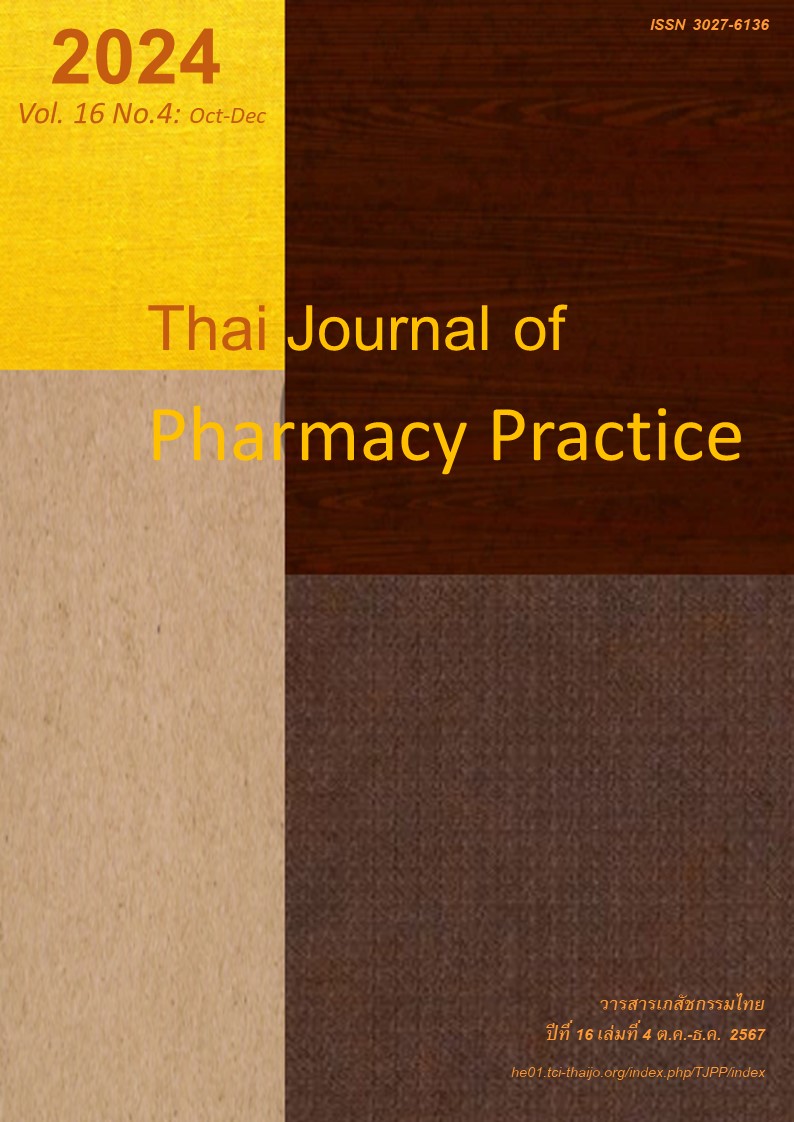การให้บริการเภสัชกรรมทางไกลสำหรับการทบทวนการใช้ยาทางโทรศัพท์ใน ผู้ป่วยภาวะสมองเสื่อมที่ได้รับยาทางไปรษณีย์: การศึกษาเชิงพรรณนาภาคตัดขวาง
Main Article Content
บทคัดย่อ
วัตถุประสงค์: เพื่อศึกษาจำนวนปัญหาและประเภทของปัญหาเกี่ยวกับการใช้ยารักษาภาวะสมองเสื่อมและอาการปัญหาด้านพฤติกรรมอารมณ์และจิตใจในผู้ป่วยภาวะสมองเสื่อมที่ได้รับยารักษาภาวะสมองเสื่อมทางไปรษณีย์ผ่านการทบทวนการใช้ยาทางโทรศัพท์ วิธีการ: การวิจัยนี้เป็นการวิจัยเชิงพรรณนาแบบตัดขวาง ระหว่างเดือนพฤศจิกายน 2565 ถึง มกราคม 2566 โดยมีกลุ่มตัวอย่าง คือ ผู้ป่วยภาวะสมองเสื่อมที่ได้รับยารักษาภาวะสมองเสื่อมทางไปรษณีย์ ณ โรงพยาบาลมหาราชนครเชียงใหม่ โดยค้นหาปัญหาเกี่ยวกับยาในผู้ป่วยจากการทบทวนประวัติในเวชระเบียนและการสัมภาษณ์ผู้ดูแลทางโทรศัพท์ การศึกษาแบ่งประเภทปัญหาเกี่ยวกับยาตามแบบประเมิน Pharmaceutical Care Network Europe (PCNE) version 5.01 ผลการวิจัย: จากการคัดกรองผู้ป่วยภาวะสมองเสื่อม 95 คน ได้ผู้เข้าร่วมการศึกษาทั้งหมด 55 คน มีอายุเฉลี่ย 78.5±10.2 ปี ส่วนใหญ่เป็นเพศหญิง (ร้อยละ 64.4) และมีภาวะสมองเสื่อมอยู่ในระดับปานกลาง (ร้อยละ 38.2) มีอาการปัญหาด้านพฤติกรรมอารมณ์และจิตใจในผู้ป่วยภาวะสมองเสื่อม ร้อยละ 83.6 มีโรคที่เป็นร่วมเฉลี่ย 2.4±1.2 โรค และได้รับยาร่วมกันหลายชนิด (ร้อยละ 81.8) การทบทวนการใช้ยา พบปัญหาเกี่ยวกับการใช้ยาในผู้เข้าร่วมการศึกษา 44 คน (ร้อยละ 80.0) คิดเป็น 76 ปัญหา ซึ่งปัญหาที่พบมากที่สุด คือ P4. ปัญหาจากการใช้ยาหรือการบริหารยา (ความไม่ร่วมมือในการใช้ยา) (ร้อยละ 31.6 ของปัญหาทั้งหมดที่พบ) ปัญหารองลงมา คือ P1. ปัญหาอาการไม่พึงประสงค์จากยา (ร้อยละ 26.3) ถัดมา คือ P6. ปัญหาอื่น ๆ (ร้อยละ 19.7) ซึ่งส่วนใหญ่เกิดจาก P6.1 ผู้ป่วยไม่พึงพอใจในการรักษาแม้ว่าจะได้รับยาเหมาะสมแล้ว สรุป: การทบทวนการใช้ยาผ่านการสัมภาษณ์ทางโทรศัพท์ทำให้พบปัญหาเกี่ยวกับการใช้ยาในผู้ป่วยภาวะสมองเสื่อมที่ได้รับยาทางไปรษณีย์ เภสัชกรและบุคลากรทางการแพทย์ควรติดตามความร่วมมือในการใช้ยาและอาการไม่พึงประสงค์ในผู้ป่วยเหล่านี้อย่างใกล้ชิด
Article Details

อนุญาตภายใต้เงื่อนไข Creative Commons Attribution-NonCommercial-NoDerivatives 4.0 International License.
ผลการวิจัยและความคิดเห็นที่ปรากฏในบทความถือเป็นความคิดเห็นและอยู่ในความรับผิดชอบของผู้นิพนธ์ มิใช่ความเห็นหรือความรับผิดชอบของกองบรรณาธิการ หรือคณะเภสัชศาสตร์ มหาวิทยาลัยสงขลานครินทร์ ทั้งนี้ไม่รวมความผิดพลาดอันเกิดจากการพิมพ์ บทความที่ได้รับการเผยแพร่โดยวารสารเภสัชกรรมไทยถือเป็นสิทธิ์ของวารสารฯ
เอกสารอ้างอิง
Thai Health Promotion Foundation. Developing a comprehensive care system for dementia patients [online]. 2019 [cited Feb 11, 2021]. Available from: www.thaihealth.or.th/Content/49850-%E0%B8% 9E%E0%B8%2.
Kaenork S. Dementia in the elderly [online]. 2005 [cited Jul 9, 2021]. Available from: www.dmh.go.th/ downloadportal/morbidity/dementia.pdf.
Neurological Institute of Thailand. Clinical practice guideline for dementia. Bangkok: Tanapress; 2021.
Rungruang K, Kanjanasilp J, Ploylearmsang C, Dud- sadeeprasert J. Pharmaceutical care in outpatients with dementia at Nakhon Ratchasima Rajanagarinda Psychiatric hospital. Isan Journal of Pharmaceutical Sciences. 2011; 7: 62-75.
Sooksa-art J, Thipraksa T, Hanrinth R, Kerdchantuk P, Suttiruksa S. Outcomes of pharmaceutical care in outpatients with Alzheimer’s disease: a pilot study. Thai Journal of Pharmacy Practice. 2018; 10: 129-41.
Xue Qin QN, Ming LC, Abd Wahab MS, Tan CS, Yuda A, Hermansyah A. Drug-related problems among older people with dementia: A systematic review. Res Social Adm Pharm 2023; 19: 873-81.
Lau ECY, Wojt I, Jeon YH, Hilmer SN, Tan ECK. Prevalence and risk factors for drug-related problems in people with dementia living in the community: a systematic review and meta-analysis. J Am Med Dir Assoc 2022; 23: 980-91.
Mok VCT, Pendlebury S, Wong A, Alladi S, Au L, Bath PM, et al. Tackling challenges in care of Alzheimer's disease and other dementias amid the COVID-19 pandemic, now and in the future. Alzheimers Dement 2020; 16: 1571-81.
Pathak S, Haynes M, Qato DM, Urick BY. Tele- pharmacy and quality of medication use in rural areas, 2013-2019. Prev Chronic Dis. 2020; 17: E101. doi: 10.5888/pcd17.200012
Morisky DE, Green LW, Levine DM. Concurrent and predictive validity of a self-reported measure of medication adherence. Med Care 1986; 24: 67-74.
Sakthong P, Sonsa-Ardjit N, Sukarnjanaset P, Mun- pan W, Suksanga P. Development and psychometric testing of the medication taking behavior tool in Thai patients. Int J Clin Pharm 2016; 38: 438-45.
Thompson K, Kulkarni J, Sergejew AA. Reliability and validity of a new medication adherence rating scale (MARS) for the psychoses. Schizophr Res 2000; 42: 241-7.
Svarstad BL, Chewning BA, Sleath BL, Claesson C. The brief medication questionnaire: a tool for screening patient adherence and barriers to adherence. Patient Educ Couns 1999; 37: 113-24.
Risser J, Jacobson TA, Kripalani S. Development and psychometric evaluation of the self-efficacy for appropriate medication use scale (SEAMS) in low-literacy patients with chronic disease. J Nurs Meas 2007; 15: 203-19.
Jongwilaikasem K, Lerkiatbundit S. Development of the medication adherence scale for Thais (MAST). Thai Journal of Pharmacy Practice. 2021; 13: 17-30.
Chua SS, Kok LC, Yusof FA, Tang GH, Lee SW, Efendie B, et al. Pharmaceutical care issues identified by pharmacists in patients with diabetes, hypertension or hyperlipidaemia in primary care settings. BMC Health Serv Res 2012; 12: 388.
Hanrin R. Classification of drugs related problems. Thai Journal of Pharmacy Practice. 2009; 1: 84-96.
Cao Q, Tan CC, Xu W, Hu H, Cao XP, Dong Q, et al. The Prevalence of dementia: a systematic review and meta-analysis. J Alzheimers Dis 2020; 73: 1157-66.
Mekawichai P, Saetang S. Caregiver burden among Thai dementia patients' caregivers. Journal of the Psychiatric Association of Thailand. 2013; 58: 101-10.
Arts M, Petrykiv S, Fennema J, De Jonge L. Off-label prescriptions of quetiapine for sleep distur- bances. Eur Psychiatry 2017; 41: S749-S50.
Ruangritchankul S, Peel NM, Hanjani LS, Gray LC. Drug related problems in older adults living with dementia. PLoS One. 2020; 15: e0236830. doi: 10. 1371/journal.pone.0236830
Forgerini M, Lucchetta RC, Oliveira FM, Herdeiro MT, Capela MV, Mastroianni PdC. Impact of pharmacist intervention in patients with Alzheimer’s disease. Braz J Pharm Sci 2022; 15: 1-13.
Arlt S, Lindner R, Rösler A, von Renteln-Kruse W. Adherence to medication in patients with dementia: predictors and strategies for improvement. Drugs Aging 2008; 25:1033-47.
Gardette V, Lapeyre-Mestre M, Piau A, Gallini A, Cantet C, Montastruc JL, et al. A 2-year prospective cohort study of antidementia drug non-persistency in mild-to-moderate Alzheimer's disease in Europe: Predictors of discontinuation and switch in the ICTUS study. CNS Drugs 2014; 28: 157-70.
Poudel A, Nissen LM. Telepharmacy: a pharmacist's perspective on the clinical benefits and challenges.
Integr Pharm Res Pract 2016; 5: 75-82.
Hewitt H, Gafaranga J, McKinstry B. Comparison of face-to-face and telephone consultations in primary care: qualitative analysis. Br J Gen Pract 2010; 60: e201-12.
Allen K, Flewelling AJ, Munro L, Naylor H. Tele- phone versus in-person pharmacist-led medication reviews in home dialysis patients: evaluating quality of care and patient satisfaction. Pharmacy (Basel). 2022; 11: 1. doi: 10.3390/pharma cy11010001.


